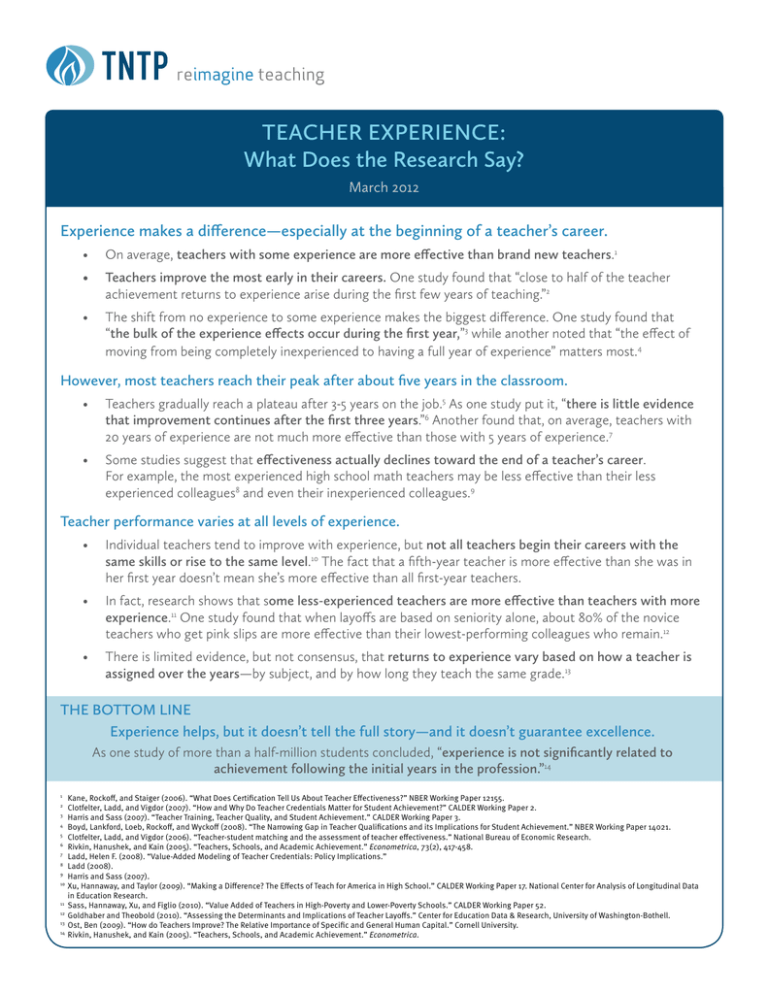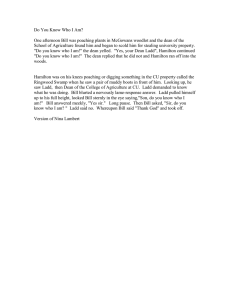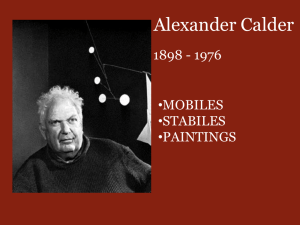Teacher experience: What Does the research Say?
advertisement

Teacher Experience: What Does the Research Say? March 2012 Experience makes a difference—especially at the beginning of a teacher’s career. • On average, teachers with some experience are more effective than brand new teachers.1 • Teachers improve the most early in their careers. One study found that “close to half of the teacher achievement returns to experience arise during the first few years of teaching.”2 • The shift from no experience to some experience makes the biggest difference. One study found that “the bulk of the experience effects occur during the first year,”3 while another noted that “the effect of moving from being completely inexperienced to having a full year of experience” matters most.4 However, most teachers reach their peak after about five years in the classroom. • Teachers gradually reach a plateau after 3-5 years on the job.5 As one study put it, “there is little evidence that improvement continues after the first three years.”6 Another found that, on average, teachers with 20 years of experience are not much more effective than those with 5 years of experience.7 • Some studies suggest that effectiveness actually declines toward the end of a teacher’s career. For example, the most experienced high school math teachers may be less effective than their less experienced colleagues8 and even their inexperienced colleagues.9 Teacher performance varies at all levels of experience. • Individual teachers tend to improve with experience, but not all teachers begin their careers with the same skills or rise to the same level.10 The fact that a fifth-year teacher is more effective than she was in her first year doesn’t mean she’s more effective than all first-year teachers. • In fact, research shows that some less-experienced teachers are more effective than teachers with more experience.11 One study found that when layoffs are based on seniority alone, about 80% of the novice teachers who get pink slips are more effective than their lowest-performing colleagues who remain.12 • There is limited evidence, but not consensus, that returns to experience vary based on how a teacher is assigned over the years—by subject, and by how long they teach the same grade.13 THE BOTTOM LINE Experience helps, but it doesn’t tell the full story—and it doesn’t guarantee excellence. As one study of more than a half-million students concluded, “experience is not significantly related to achievement following the initial years in the profession.”14 4 5 6 7 8 9 Kane, Rockoff, and Staiger (2006). “What Does Certification Tell Us About Teacher Effectiveness?” NBER Working Paper 12155. Clotfelter, Ladd, and Vigdor (2007). “How and Why Do Teacher Credentials Matter for Student Achievement?” CALDER Working Paper 2. Harris and Sass (2007). “Teacher Training, Teacher Quality, and Student Achievement.” CALDER Working Paper 3. Boyd, Lankford, Loeb, Rockoff, and Wyckoff (2008). “The Narrowing Gap in Teacher Qualifications and its Implications for Student Achievement.” NBER Working Paper 14021. Clotfelter, Ladd, and Vigdor (2006). “Teacher-student matching and the assessment of teacher effectiveness.” National Bureau of Economic Research. Rivkin, Hanushek, and Kain (2005). “Teachers, Schools, and Academic Achievement.” Econometrica, 73(2), 417-458. Ladd, Helen F. (2008). “Value-Added Modeling of Teacher Credentials: Policy Implications.” Ladd (2008). Harris and Sass (2007). 10 Xu, Hannaway, and Taylor (2009). “Making a Difference? The Effects of Teach for America in High School.” CALDER Working Paper 17. National Center for Analysis of Longitudinal Data in Education Research. 11 Sass, Hannaway, Xu, and Figlio (2010). “Value Added of Teachers in High-Poverty and Lower-Poverty Schools.” CALDER Working Paper 52. 12 Goldhaber and Theobold (2010). “Assessing the Determinants and Implications of Teacher Layoffs.” Center for Education Data & Research, University of Washington-Bothell. 13 Ost, Ben (2009). “How do Teachers Improve? The Relative Importance of Specific and General Human Capital.” Cornell University. 14 Rivkin, Hanushek, and Kain (2005). “Teachers, Schools, and Academic Achievement.” Econometrica. 1 2 3




